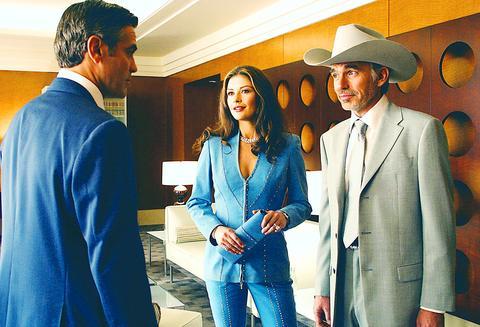Between a lethargic trailer propped up by Gimme Some Lovin and the mainstream-sentimentalist producer Brian (A Beautiful Mind) Grazer's name on the credits, there's plenty of reason for an involuntary recoil toward the Coen Brothers' fearsomely titled new movie, Intolerable Cruelty. But the film is not shudder-worthy.
Instead, it's something not seen in movie theaters for a long time: an intelligent, modern screwball comedy, a minor classic on the order of competent, fast-talking curve balls about deception and greed like Mitchell Leisen's Easy Living and Billy Wilder's Major and the Minor.
This film -- from material by Robert Ramsey, Matthew Stone and John Romano that the Coens reworked a bit -- has the kind of swift, smart farcical writing that has actually found a snugger nest in television series comedy than in theaters. (Yet the movie takes a shot at television by hoisting a slickster reality-show producer, played by Geoffrey Rush, on something like his own petard.)

PHOTO COURTESY OF UNIVERSAL
Intolerable Cruelty, which opens nationwide today, shares something with comedic entries in the Coen canon like The Big Lebowski and Raising Arizona: a full-blooded movie-star performance to get it squarely into the strike zone. This time the good work comes from George Clooney, who happens to have the Art Deco profile fit for a 1930's comedy. He scores with his willingness to mock his above-average charisma level and the chiseled chin, cover-guy good looks that make him seem as if he were sketched by Mort Drucker and inked by Chester Gould.
Clooney's gift of gab is perfectly suited for his role as the creme de la creme of divorce lawyers Miles Massey. The movie introduces Miles by focusing in on his constantly moving mouth as he absently barks instructions on his cellphone, while getting a teeth-whitening job that makes his choppers so pearly they look like paint samples for refrigerator surfaces.
He is so self-possessed a winner that his larynx is on autopilot. This is made clear in a laugh-rich divorce-court scene early on: what looks like an intense whispered case discussion between the lead lawyer, Miles, and his second chair, Wrigley (Paul Adelstein), instead turns out to be a glorious summary of Miles's fatuousness.

Miles has everything but a soul, though he doesn't actually look as if he'd require one. And the babe he falls for isn't exactly the girl to give him one either. Marylin (Catherine Zeta-Jones), as delectable as a white-chocolate Easter Bunny, has been tagged for a vicious divorce by her serial-adulterer husband, Rex Rexroth (Edward Herrmann), after she catches him cheating.
She's the wronged party, which makes her all the more attractive to Miles. Though it doesn't make her so hot that he refuses to take her on in court, and he defuses the parries of her lawyer, Freddy Bender (the always reliable Richard Jenkins), like a pipe bomb in a Richard Donner movie. "Struggle, challenge and the ultimate destruction of your opponent -- that's life," Miles sighs contentedly.
Marylin may be the victim in this case, but she's no innocent. And when she jabs a No. 2 pencil into Miles's heart by showing up with her Texas millionaire beau, Howard Doyle (Billy Bob Thornton), who's so flashy he seems to have stepped out of a 1950's stage musical, Miles is horrified -- but not defeated. He is now determined to win her over. That's what makes the picture work so beautifully. It's a movie about underhanded professionals by filmmakers -- the director Joel Coen and the producer Ethan Coen, and probably to some extent, Grazer -- who delight in the epitome of criminal enterprise. There's more shadiness here than in all of Vermont in October.
Zeta-Jones's performance complements Clooney's with a perfidious elegance. Her uptown-girl beauty and silken opacity -- that ability to not let on what she's thinking, even to herself -- make her the kind of trophy Miles would want to own. And she coos so lushly that Marylin's hand-tailored cool is even more beguiling: she knows advertising that she's an opportunist is a bad way to conduct business, which in her case is finding rich-husband material.
That joy in low-down behavior is kept on the down-low. Cedric the Entertainer plays a crass, but direct, video surveillance expert, Gus Petch, who becomes the point of intersection in the world of Miles and Marylin. Cedric delivers the crassest lines with what can only be called hammy understatement; his years of stand-up have taught him that less is all.
The picture lacks the manic, red-line highs that make for great trailers and ragged films. It's not the kind of dark comedy that Grazer has produced previously -- like Greedy and For Love or Money -- that finally soften the characters' acquisitive behavior with a fatty dollop of sentimental mayonnaise.
The Coens, bless their hearts, are too smart to apologize for avarice -- it's what gave screwball comedies a kick, and sends this movie straight to your head. Keep in mind that it's only a minor rush, but a rush nonetheless. It has a Jell-O-shot smoothness that makes you a little dizzy afterward in recollecting how assured and unremittingly smart Intolerable Cruelty is. The second word in the title is a little too apt; this movie should pack a license to kill.

When life gives you trees, make paper. That was one of the first thoughts to cross my mind as I explored what’s now called Chung Hsing Cultural and Creative Park (中興文化創意園區, CHCCP) in Yilan County’s Wujie Township (五結). Northeast Taiwan boasts an abundance of forest resources. Yilan County is home to both Taipingshan National Forest Recreation Area (太平山國家森林遊樂區) — by far the largest reserve of its kind in the country — and Makauy Ecological Park (馬告生態園區, see “Towering trees and a tranquil lake” in the May 13, 2022 edition of this newspaper). So it was inevitable that industrial-scale paper making would

July 21 to July 27 If the “Taiwan Independence Association” (TIA) incident had happened four years earlier, it probably wouldn’t have caused much of an uproar. But the arrest of four young suspected independence activists in the early hours of May 9, 1991, sparked outrage, with many denouncing it as a return to the White Terror — a time when anyone could be detained for suspected seditious activity. Not only had martial law been lifted in 1987, just days earlier on May 1, the government had abolished the Temporary Provisions Effective During the Period of National Mobilization for Suppression of the Communist

Hualien lawmaker Fu Kun-chi (傅?萁) is the prime target of the recall campaigns. They want to bring him and everything he represents crashing down. This is an existential test for Fu and a critical symbolic test for the campaigners. It is also a crucial test for both the Chinese Nationalist Party (KMT) and a personal one for party Chairman Eric Chu (朱立倫). Why is Fu such a lightning rod? LOCAL LORD At the dawn of the 2020s, Fu, running as an independent candidate, beat incumbent Democratic Progressive Party (DPP) lawmaker Hsiao Bi-khim (蕭美琴) and a KMT candidate to return to the legislature representing

Asked to define sex, most people will say it means penetration and anything else is just “foreplay,” says Kate Moyle, a psychosexual and relationship therapist, and author of The Science of Sex. “This pedestals intercourse as ‘real sex’ and other sexual acts as something done before penetration rather than as deserving credit in their own right,” she says. Lesbian, bisexual and gay people tend to have a broader definition. Sex education historically revolved around reproduction (therefore penetration), which is just one of hundreds of reasons people have sex. If you think of penetration as the sex you “should” be having, you might